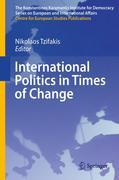
There is every indication that the international system is undergoing a period of significant transformation. The substantially higher growth rates of the emerging-market economies in comparison with those of the developed economies are changing the global distribution of power. Studies project that if economic trends are not reversed in the coming years, China will surpass the US and become the world’s largest economy, India will emerge in Japan’s place as the third-largest economy and Brazil will outpace Germany as the fifth-largest. This book underscores the complexity of forecasting international politics and proceeds cautiously to investigate the questions of change and continuity, examining several actors with respect to multiple issues and across different levels of analysis. Taken as a whole, this collection of essays offers a series of snapshots of different aspects, and from varying angles, of an international system in motion. Examines ongoing transformations in the international system, paying attention to the developed great powers and the BRIC countries. Analyses international politics at three levels: the system, the unit and the individual. Takes stock of recent key developments: the world financial crisis, China’s economic emergence, two years of Obama’s presidency and the European Union’s Treaty of Lisbon Reflects, a decade later, on post-9/11 international terrorism. INDICE: The Established Global Players. The Emerging Global Players. Issues in International Politics.
- ISBN: 978-3-642-21954-2
- Editorial: Springer Berlin Heidelberg
- Encuadernacion: Cartoné
- Páginas: 300
- Fecha Publicación: 06/09/2011
- Nº Volúmenes: 1
- Idioma: Inglés
